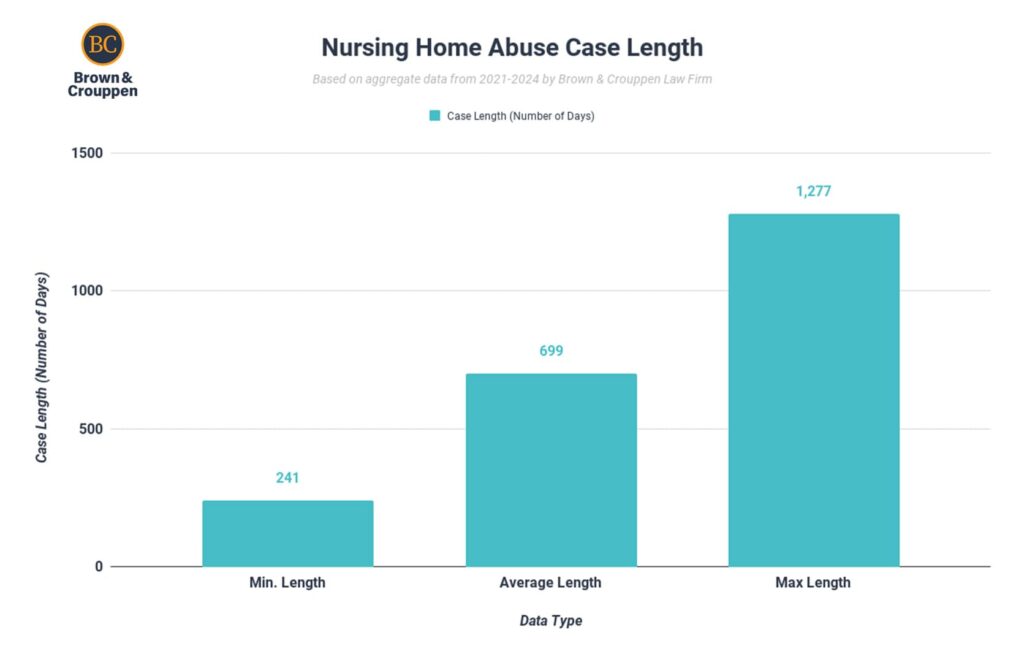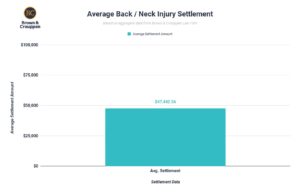The average length of a nursing home abuse & neglect case is 699 days (or approximately 2 years). Nursing home abuse cases often take between 1 and 2 years to settle, but the length of a case will ultimately depend on the unique circumstances and factors of the case. This includes case factors like severity of injuries, negligence & liability, and whether or not the case goes to trial.
Note: This case data is based on real data derived from cases between 2021 and 2024. Average case length values should not be interpreted as an expected case timeline.
Understanding the Nursing Home Abuse Case Timeline
- Reporting & investigation: The first step in any abuse case is to report the suspected nursing home abuse to the appropriate authorities, such as the nursing home management, Adult Protective Services (APS), or law enforcement agencies. The time taken for these organizations to initiate an investigation can vary, depending on their caseload and the severity of the reported abuse.
- Gathering Evidence: Once an investigation is underway, evidence must be collected to support the case. This involves interviewing witnesses, reviewing medical records, and collecting any relevant physical evidence. The time it takes to gather this information depends on the complexity of the case and the cooperation of the parties involved.
- Selecting an Attorney: Nursing home abuse victims or their families often consult with attorneys who are experienced in elder abuse cases. The selection process and the attorney’s workload can influence the timeline. It is crucial to find a knowledgeable nursing home abuse attorney who has a track record of providing exceptional legal representation.
- Filing the Lawsuit: If negotiations with the nursing home like Senath South Health Care Center or responsible parties fail to resolve the issue satisfactorily, a lawsuit may need to be filed. This involves drafting legal documents, serving notices, and meeting court-imposed deadlines. The duration of this phase can vary significantly based on the court’s caseload and the complexity of the case.
- Discovery Process: During a nursing home abuse lawsuit, both parties engage in the discovery process, where they exchange information and evidence related to the case. This phase can be time-consuming as it includes depositions, document requests, and other legal procedures.
- Mediation & Settlement: Many nursing home abuse cases are resolved through mediation or negotiation, which can expedite the process. The time it takes to finalize and reach a nursing home abuse settlement can vary depending on the willingness of the parties involved to negotiate and the complexity of the issues at hand.
- Trial: If a settlement cannot be reached, the case proceeds to trial. The trial process can be lengthy, involving pre-trial motions, jury selection, presentation of evidence, witness testimonies, and legal arguments. The court’s schedule and backlog of cases can impact the trial’s timeline.
Factors That Can Impact The Timeline of A Nursing Home Abuse Case
- Case Complexity: Cases involving multiple instances of abuse, multiple victims, or a history of neglect may require more time for thorough investigation and legal preparation.
- Availability of Evidence: Difficulty in obtaining medical records, surveillance footage, or witness testimonies can delay the presentation of crucial evidence during negotiations or at trial.
- Witness Credibility: The credibility of witnesses can be challenged, leading to the need for further investigation and possibly additional hearings or depositions, which can extend the timeline of a nursing home abuse case.
- Mediation & Negotiation: Disagreements between parties during settlement negotiations can lead to prolonged back-and-forth discussions, which can cause delays and extend the time that it takes to reach a resolution.
- Legal Representation: Delays can occur if the plaintiff or defendant changes legal counsel, leading to a period of transition and adjustment for the new attorney.
- Court Dockets & Scheduling: There may be a conflict in court schedules, or they may be congested. This can cause delays when setting trial dates or hearing motions, which can add significant delays.
- Expert Witnesses: The need for expert witnesses such as healthcare professionals may result in delays due to the time required to secure their availability for depositions or trial testimony.
- Defendant’s Insurance Company: The defendant’s insurance company may attempt to prolong the case by delaying settlement discussions or negotiations
- Discovery Disputes: Disagreements over the scope of discovery, including document production and depositions, can lead to court interventions. This generally leads to an increased time length for the pre-trial phase of a case.
- Appeals & Post-Trial Motions: If either party is dissatisfied with the outcome of the trial, they may file appeals or post-trial motions, which can prolong a nursing home abuse case by months (or even years in some cases).
- Health of the Plaintiff or Defendant: If either the plaintiff or defendant experiences health issues during the case, it may result in continuances and delays in court proceedings.
- Settlement Authority: Delays can occur if the nursing home or defendant’s representatives lack the authority to make settlement decisions, which can add additional steps and considerations to the litigation process.
- Geographical Considerations: Cases involving out-of-state parties or witnesses may require additional time for coordination, travel, and legal procedures across different jurisdictions.
- Changing Legal Landscape: Changes in governing nursing home laws or regulations during the case can lead to legal challenges and arguments, adding complexity and time to the proceedings.
Additional Legal Considerations For Nursing Home Abuse Cases
One critical legal consideration in nursing home abuse cases is the statute of limitations. This is a time limit within which a lawsuit must be filed after the abuse occurred. Statutes of limitations vary by state and can range from one to several years. Failure to file within the specified timeframe can result in the case being dismissed.
In nursing home abuse cases, the statute of limitations typically begins to run from the date the abuse occurred, the date it was discovered, or the date it should have been discovered with reasonable diligence. However, there are exceptions and nuances depending on the specific circumstances of each case and the laws of the state in which the abuse occurred.
Get Help With Your Nursing Home Abuse Case From Brown & Crouppen Law Firm
The Kansas City nursing home abuse lawyer & St. Louis nursing home abuse lawyers at Brown & Crouppen Law Firm are highly experienced and can help you build a strong claim. Getting started is easy. Request a free case evaluation online or call 888-801-4736. And remember, our attorneys work on a contingency-fee basis, meaning there are no upfront costs or legal fees – we only get paid if you win.
Since 1979, our personal injury attorneys have helped recover over $1 billion as a result of settlements and verdicts, including from nursing home abuse & neglect cases. Our nursing home abuse attorneys can answer any legal questions you may have and help you build a strong case to maximize compensation.








